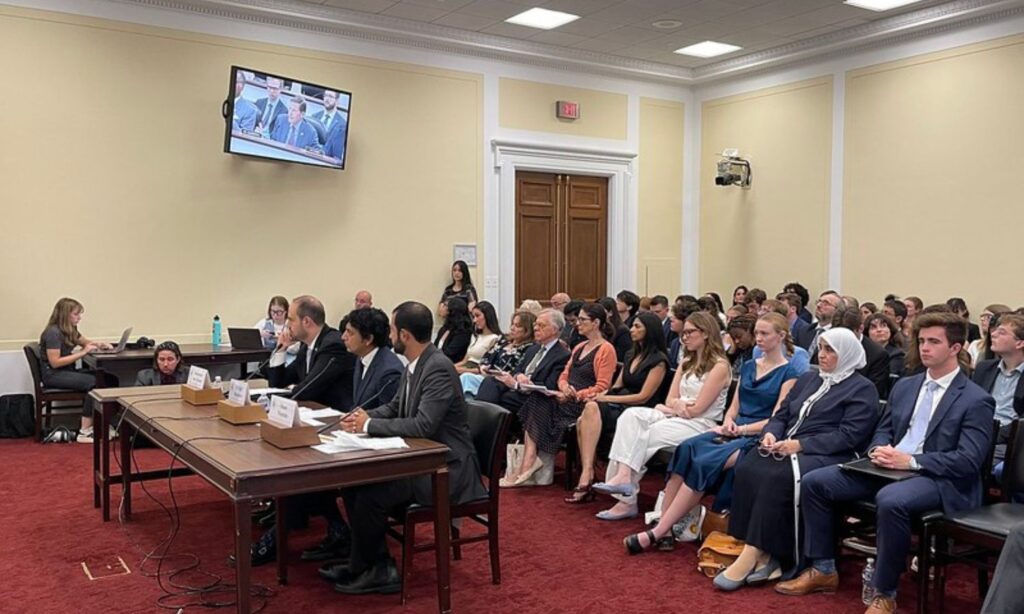Negotiations led by the Syrian-American lobby to revive the Assad Regime Anti-Normalization Act collapsed after being previously obstructed by US President Joe Biden.
Mohammed Ghanem, a former member of the American Coalition for Syria, said on the evening of Monday, July 29, that negotiations with Democratic Senator Ben Cardin regarding the adoption of the Assad Regime Anti-Normalization Act collapsed entirely due to the insistence of the senator’s office on making very significant amendments to the draft, which would undermine its primary objectives.
Ghanem added via his account on the platform “X,” “For the past two months, we and our Senate allies have been deeply engaged in intense negotiations with Senator Cardin’s office, advocating tirelessly for the passage of this critical human rights bill. Throughout these discussions, we have shown great flexibility, willing to accept reasonable amendments that would not compromise the bill’s core principles.”
The insistence of Senator Cardin’s office, prompted by the Biden administration according to Ghanem, on removing many provisions, including those designed to protect refugees’ properties from seizure and theft, combat the theft of humanitarian aid, and amend the clause related to prohibiting normalization with any government led by Bashar al-Assad, among other things, led to the complete collapse of the negotiations.
Ghanem confirmed that this setback “will not stop the efforts to push the Assad Regime Anti-Normalization Act forward, especially since it enjoys widespread popularity and support,” looking forward to working with the next Senate Foreign Relations Committee chair after Senator Cardin’s retirement at the end of this year.
Syrian organizations in the United States have sought in recent months to revive the Anti-Normalization Act with Bashar al-Assad after it was obstructed about two and a half months ago by President Joe Biden, despite being overwhelmingly approved by the House of Representatives.
Efforts to revive the act were manifested through the Helsinki Commission specializing in human rights in the US Congress, holding a special session on July 10 to discuss the war crimes committed by the Syrian regime, aiming to bring the Anti-Normalization Act into effect.
Syrian lobby pressure
A vast Syrian lobby exists in the United States comprising civil society organizations, businessmen, opinion leaders, and Syrian-American politicians, who consistently raise issues related to Syria in Congress.
This lobby contributed to presenting many projects, including the Assad Regime Anti-Normalization Act of 2023, worked on by the American Coalition for Syria, an umbrella under which ten American organizations concerned with Syrian issues collaborated. The coalition held 327 meetings and visits over months leading to the approval of the bill in Congress.
The Coalition presented the draft law to the House Foreign Relations Committee, and it was passed overwhelmingly. However, President Biden obstructed it at the end of last April.
Regarding the reason for Biden’s obstruction of the draft law, Mohammed Ghanem told Enab Baladi that it “is because the draft law carries real and not symbolic effects, and if approved, it would change the current US policy, but the Biden administration does not want to alter its policy towards al-Assad, so it intervened and asked Senator Ben Cardin to obstruct the draft law.”
Ghanem warned that giving the US permission for Arab countries to normalize relations with the regime might encourage European countries to approach al-Assad to resolve the refugee issue, noting that some believe the matter currently only concerns Turkey and Lebanon. Still, there has been a covert European movement to normalize with al-Assad, which began coming to light after Italy appointed an ambassador to Syria.
Italy decided to appoint an ambassador to Syria, the first move after European countries called to reassess their relations with Syria and engage with the regime.
Reuters reported on Friday, July 26, that Italian Foreign Minister Antonio Tajani said Stefano Ravagnan, who was the Foreign Ministry’s special envoy to Syria, was appointed ambassador and is set to take up his position in Damascus soon.
What is Assad Regime Anti-Normalization Act?
The Assad Regime Anti-Normalization Act was initially proposed in the House of Representatives on May 11, 2023, when the House Foreign Relations Committee unanimously approved it after two days of work from the date of its proposal, in a speed described as “unprecedented in legislative tradition.”
On February 14 of the past year, the US House of Representatives approved the draft law, where 389 members (an overwhelming majority) from both parties, Democratic and Republican, voted in favor of the law, while 32 others opposed it.
The draft law stipulates that the United States will not recognize or normalize relations with any Syrian government led by Bashar al-Assad and will develop an annual strategy to counter normalization with the Syrian regime, targeting countries that have taken steps to normalize with it.
The draft law includes strengthening the sanctions stipulated under the Caesar Act of 2019 by extending its provisions, which were scheduled to end in 2024, until 2032.
It also entails expanding sanctions to include entities that transfer humanitarian aid or seize properties from Syrians for welfare or personal gain, along with expanding the sanctions to include Syria’s People’s Assembly and senior officials of the Baath Party.

